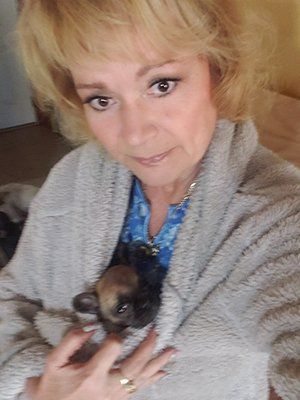Puppy Training & Socialization
stephanie schenk • February 15, 2021
Your Puppy's Beginning To 12 Weeks

By the time a puppy is 5-6 months old it takes a lot more repetitions for them to learn something. It can take months to make up for what you could get with just a couple exposures when young. There may be practical limits to what can be made up for whatever was missed when young. Socialization only lasts until 12 weeks old, which is why we welcome owners and as many visitors as possible at my house. After 12 weeks you have missed that window and it becomes much harder to socialize a pup the older they get. The first 12 weeks of your puppy’s life are the most important which is why carefully choosing your breeder is so important.
Womb~ Our program starts while they are still in their Dams belly. Puppies react to being petted and rubbed while still in the belly. Lots of rubbing and petting of them while still in the womb creates docile pups that like to be petted. My girls always get as much attention as they want, when pregnant they want extra lap time and they get it.
Birth to 16 days~ Once pups are born and until their eyes and ears open I will be practicing early neurological stimulation on them also known as the “Super Dog” program. Only about 35% of a puppy is controlled by heritable factors, the remaining 65% is attributable to other influences, such as training, management and nutrition. EEG measures show that pups and kittens when given early stimulation exercises mature at faster rates and perform better in certain problem solving tests than non-stimulated mates.
Studies confirm that there are specific time periods early in life when neurological stimulation has optimum results. The first period involves a window of time that begins at the third day of life and lasts until the sixteenth day. It is believed that because this interval of time is a period of rapid neurological growth and development, and therefore is of great importance. The "Bio Sensor" program was also concerned with early neurological stimulation in order to give the dog a superior advantage. The handling of each pup once per day involves the following exercises:
1. Tactical stimulation (between toes)
2. Head held erect
3. Head pointed down
4. Supine position
5. Thermal stimulation
When eyes open~ Is the startle period. I will startle the pups in any way I can think of. Slamming doors, Rob Zombie radio, dropping books, etc. Startled pups recover faster and learn to not be fearful and it makes for easy going adults that are less likely to react out of fear or from loud noises.
4 weeks~ Communication training. I add a potty area and start potty training. I start letting run around, meeting other dogs and puppies. Lots of interaction, talking to and they start learning experiences like how to climb over things. They’re old enough to start playing with toys, so lots of different toys are added to environment.
5 weeks is Fear Period~ This is a single imprint period which means a single bad experience will imprint. No bad experiences during this time. Encounters with other dogs or people need to be very structured. I’ll let the puppy deal with things on his/her own. I’ll keep introducing new things. Small startle responses with fast recovery. No coaxing, just praise when fears are overcome. No comforting a fearful pup UNLESS it is a truly horrific or scary thing that happens.
6 weeks Socialize~ I want lots of visitors, but absolutely NO bad experiences. Visitors wearing hats and glasses and various things. Pups are walking well by this time, so they are introduced to outside around this time. Everything builds confidence by new experiences. Puppies will learn to use steps and overcome things. Running around trying new things are learning and problem solving exercises. Animals who are given problem solving and learning exercises in addition to toys and social interaction grow up to be more stable, less easily stressed, less easily frightened with better learning and memory. Overcoming tasks will make them more confident and calmer in the future.
8 weeks~ is a fear period too~! Be EXTRA vigilant and allow no negative experiences. One bad experience during this time, takes 10 good experiences to erase. This is why I prefer not to let pups go to new homes until 9 weeks, unless specifically requested.
9-12 weeks~ get out and take your puppy places. Drive in car, so won’t get car sick as adult. Swim in baby pool or bathtub with them, so they will like water in Summer months. Just because you don’t want to set your pup down where strange, possibly sick dogs have been, doesn’t mean they can’t be socialized while being carried or in a stroller. Never allow a stranger to manhandle your puppy scaring them. People have strange ideas that manhandling a puppy, scaring the crap out of them, toughens them up. A scary experience takes many good experiences to undo.





